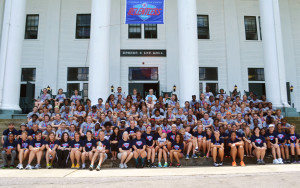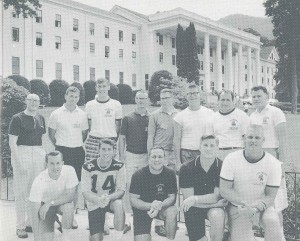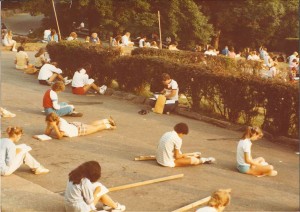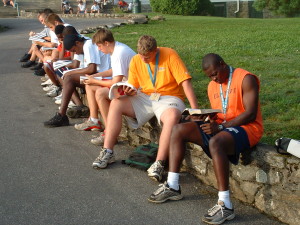Robert E. Lee Hall towers over the YMCA Blue Ridge Assembly campground on Black Mountain, N.C. Eight majestic white columns buoy the entrance fronted by eight long, wide steps ascending to the wooden platform porch where dozens of green, wooden rocking chairs sprawl out across the deck.
“The things that have happened there, the lives that have been changed—it’s a powerful place,” said Lance Shealy, Black Mountain Boys FCA Camp director. “It’s the reason why we continue to hold camp there today. It’s because of the legacy and impact FCA Camp at Black Mountain has had on thousands of young people and coaches.”

Campers and coaches have posed in front of Robert E. Lee Hall at the YMCA Blue Ridge Assembly since FCA Camp at Black Mountain, N.C., began in 1964.
The porch at Lee Hall overlooks the north side of the Blue Ridge Mountains. On a clear day, it’s said you can sit in one of those rocking chairs and see the mountaintops, a sign of God’s amazing handiwork and beauty.
No wonder Billy Graham used to use the spot for his devotion time. During the winters, with the camps quiet and a chill in the air, Graham—who lives just a few miles away—would pull his car up to the front steps of Lee Hall, walk up, sit down in a rocking chair and read his Bible and pray.
“Billy knew he’d be close to God up there,” said Wayne Atcheson, a former camper and one of the earliest FCA staff members.
Over the years, the forest green rockers have become a signature of Black Mountain, openly inviting every guest to come and rest in God’s wonder. Longtime FCA supporter Albert Long calls the chairs “the trademark of Black Mountain,” a place where he met one of his very best friends many years ago.
“It’s just a special place,” Shealy said. “Unless you’ve been to FCA Camp at Black Mountain and experienced it, words don’t do it justice. You wouldn’t have enough pa-per—or pages in [FCA] Magazine—to describe it. You need a magazine dedicated to that to do it.”
• • •
Atcheson arrived at Black Mountain the first Sunday of June 1964, the first day of the inaugural FCA Camp in the North Carolina mountains. A would-be reporter, Atcheson spent the next week recording his experience in a small, black notebook.
“I wrote down everything that moved,” he said.
The entire FCA leadership staff including Executive Director James Jeffrey, Dick Harp, Bill Krisher, Ron Morris, Lauren Young, Don Lash, and more than 500 campers and 150 coaches were in attendance. On the eve of the first camp, everyone poured into College Hall to hear Army head football coach Paul Dietzel.
“It’s a challenge to be a Christian, and it’s a challenge to be an athlete,” Atcheson remembered Dietzel saying. “However, the real challenge is to be both. When you become an athlete, you have a responsibility. You have a responsibility to be a good example with the ability God gave you.”

Black Mountain Boys FCA Camp attendees in 1967.
Atcheson was floored by Dietzel’s message. Throughout the week he listened and wrote, and wrote and listened, as coaches and athletes shared their testimonies. He couldn’t believe what he was hearing.
“I’d never heard a college athlete give a testimony before,” Atcheson said. “I was just sitting back, spellbound, so impressed that a boy you saw on television playing for Georgia or LSU was up their witnessing. This was all new to everybody.”
Each morning, FCA campers woke at 6:30 a.m. to a recording of “Carolina in the Morning” followed by breakfast, worship, Huddles, Dogpatch Olympics (a competition comprised of a variety of sports), lunch, sport clinics, dinner, worship, Huddle and quiet time on the porch, sitting in those rocking chairs.
“You can sit up there and feel that all is well with the world,” Atcheson said. “You’d never have a more peaceful place where you could look over the mountains, no horns blowing, no hustle and bustle. You’d just like to stay there for the rest of your life.”
In between “Carolina in the Morning” and the bugle, FCA campers listened to South Carolina basketball coach Frank McGuire, Baltimore Colts linebacker Don Shinnick and Minnesota Vikings quarterback Fran Tarkenton.
“I thought, ‘My goodness, here’s an All-Pro quarterback right here talking about the love of God, the love of Christ,’” Atcheson said.
Needless to say, God’s work at Black Mountain transformed Atcheson’s life. In 1965, he went to work at FCA’s national offices in Kansas, becoming the eighth staff member at the time. (The organization now employs more than 1,100.) He left FCA in 1971 but later authored “Impact for Christ,” chronicling the first 30 years of FCA history. Today, Atcheson serves in ministry relations as the historian for the Billy Graham Library in Charlotte, N.C.
“I thought when I got to Black Mountain it was the nearest thing I’d experienced on earth to what Heaven must be like,” Atcheson said. “There was just a real sadness when you had to leave. You thought you’d never experience anything like this again.”
• • •
FCA held its first national camp at Estes Park, Colo., in 1956. Over the next few years, a couple more popped up in places like Henderson Harbor, N.Y., and Lake Geneva, Wis., before Black Mountain’s first camp in 1964. By the end of the decade, FCA had organized 16 national camps boasting more than 7,000 attendees. By 1978, coaches and athletes from across the country were attending camps at 32 different FCA sites, doubling its number from a decade earlier.
In 1979, Black Mountain launched its first girls camp. Throughout the 1980s, the multi-sport camp drew coaches and athletes from around the country.
Kim Boyce, the area director for Volusia County, Fla., attended her first camp at Black Mountain in 1981.
“The very first year there I came away thinking, ‘If this was even a taste of what Heaven is like…’” she said, pausing to catch her breath through tears, before continuing. "'I understand why Heaven will be so special. Black Mountain is one step below Heaven.'"
Boyce joined the FCA staff as a full-time employee in July 1995 as an area representative in Orlando, Fla., followed by stints in Thomasville, Ga., and Atlanta. She has since returned to Florida, but she has never missed a summer camp at Black Mountain, from 1981-2013, including last year’s girls camp's 35th anniversary celebration. During her time in the mountains of North Carolina, Boyce witnessed the power of prayer and the Holy Spirit at work in thousands of lives.
“We had a girl who came to us one year from Louisiana, the most homesick girl I’ve ever talked to,” Boyce said. “She begged and pleaded with her mom to come pick her up the first night. It was a 24-hour drive. She finally went to sleep. The next day I saw her after competition, and she had a smile on her face. She was loving camp. It was a 180-degree turnaround.”
The following year, the young girl returned to Black Mountain—this time with her mother, who served as a chaperon.
“Her mom went to coach’s camp and accepted Christ,” Boyce said. “She came up to me and thanked me for how we took care of her daughter the year before and what an impact the camp made on her life. The girl’s mom wanted to come back and experience coach’s camp because of how it impacted her daughter.”

Time spent in God's Word has been a staple at FCA Camps for decades.
Last year also marked Boyce’s final year as Black Mountain Girls FCA Camp director. During camp, the staff thought of a way to say thank you to their leader, giving Boyce one of those coveted rocking chairs as a gift. Across the slats on the back of one chair now reads, “Nothing could be finer; Girls FCA, Black Mtn, NC; We love you Kim; Phil 1:3.”
Although she is no longer director, Boyce can always go back. The rocking chair now sits in her living room. Sometimes she will just sit and rock and think of the friendships, the relationships, her faith and her time at Black Mountain FCA Camp.
• • •
This June marks the 50th Anniversary of Black Mountain FCA Camp. Shealy, who also serves as FCA area director for Northwest North Carolina, is busy preparing the celebration, and the staff at Lee Hall is busy cleaning and refurbishing the rocking chairs. It won’t be long before the guests will arrive, the coaches will coach, the athletes will compete in the summer sun, all sharing a single goal: to honor and glorify Jesus Christ through athletic performance.
“It’s really helping young athletes compete in light of the gospel,” Shealy said. “We talk about that, but what we want to do is show them how to compete with Christ at the center of your goals, your motivation and how you define winning.”
FCA Camp will open June 23 at YMCA Blue Ridge Assembly. The camp is designed to teach the character qualities needed by athletes to compete at their highest level, and wanted by coaches looking for athletes who have the inner strength and spirit of champions.
Since its inception, Black Mountain FCA has expanded and evolved. With athletic preparation now a central focus in today’s culture, FCA Camps are placing more emphasis on filling the spiritual need. Shealy said Black Mountain will combine athletic skill development with an emphasis on teamwork, trust and faith.

Quiet time for campers at Black Mountain in 2007.
“God does have a plan for you through sports,” he said. “He wants to use sports in our lives for the purpose of conforming us into the image of Christ and glorifying Him, not ourselves or our selfish desires of success and significance.”
Shealy knows the power of camp at Black Mountain because he, too, lived it. His first memory of it came in the summer of 1971, seeing linebacker Mike Kolen and defensive back Tim Foley from the Miami Dolphins. Shealy was awestruck.
“All the guys that you’ve watched and read about, it was like walking onto the sports page,” Shealy said. “Guys were sharing their faith and explaining why it was important to them. This was before ESPN. These were your heroes. These guys were teaching the skills of football and investing in the lives of young people through sport. As clinicians they were also being ministered to because there was nothing else like this camp in the country.”
• • •
Years have passed and thousands of campers and coaches have come and gone. While the numbers are impressive, they only tell part of the story.
“Only God can measure the conversion experiences, commitments made, vocational callings heard, lifelong friendships and relationships that have resulted, and the fruit that continues to be born from this holy ground,” Atcheson wrote in one of his final entries in that small, black notebook.
This June, the celebration begins again, as it has since 1964. Athletes and coaches from across the country will converge on YMCA Blue Ridge Assembly for FCA Camp. New and familiar faces will arrive, competitive spirit will swell, and a summer breeze will sweep across the deck at Lee Hall, where the rocking chairs wait.
Originally published May 2014
Photos courtesy of Blue Ridge Assembly YMCA and Kim Boyce